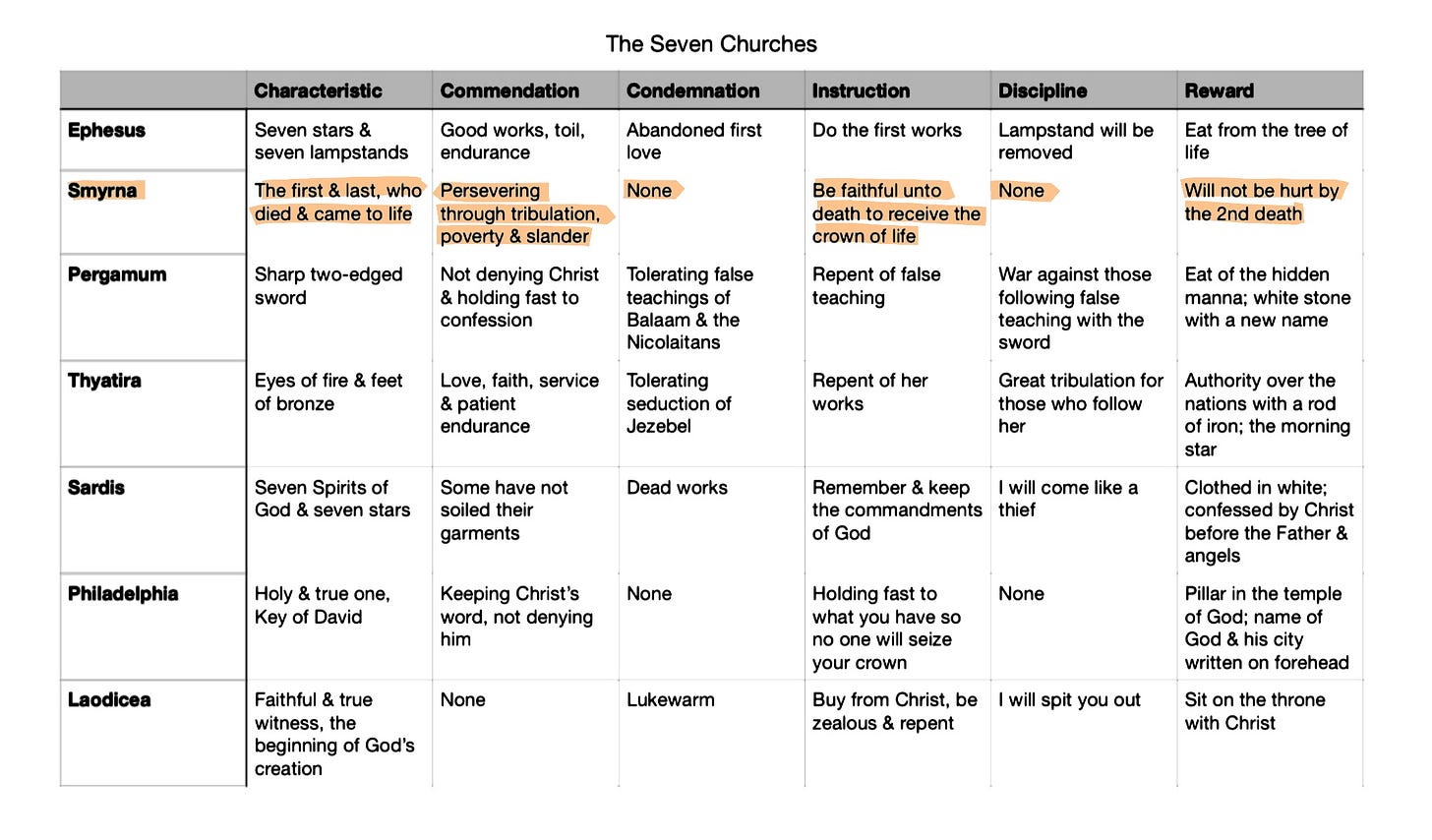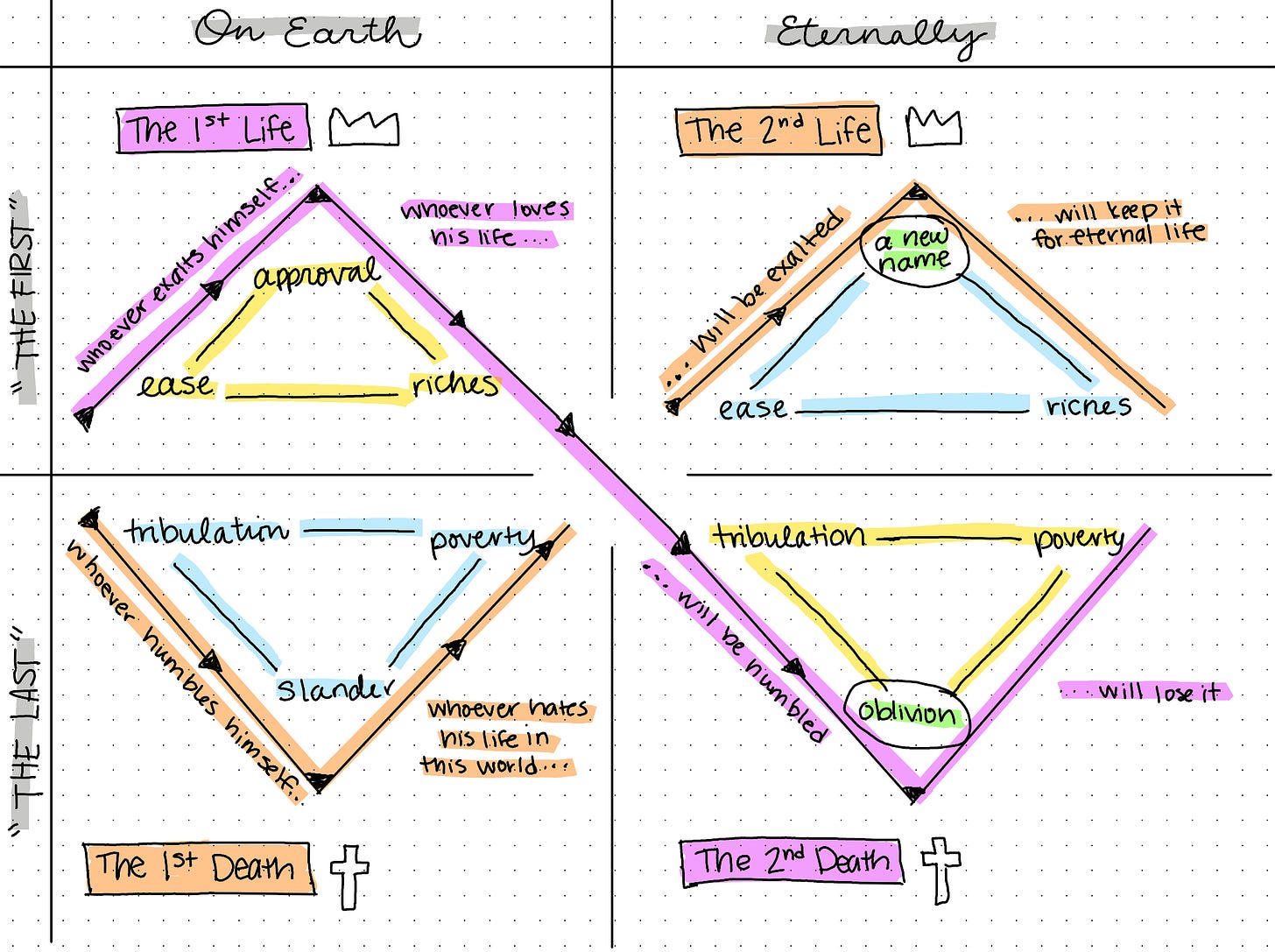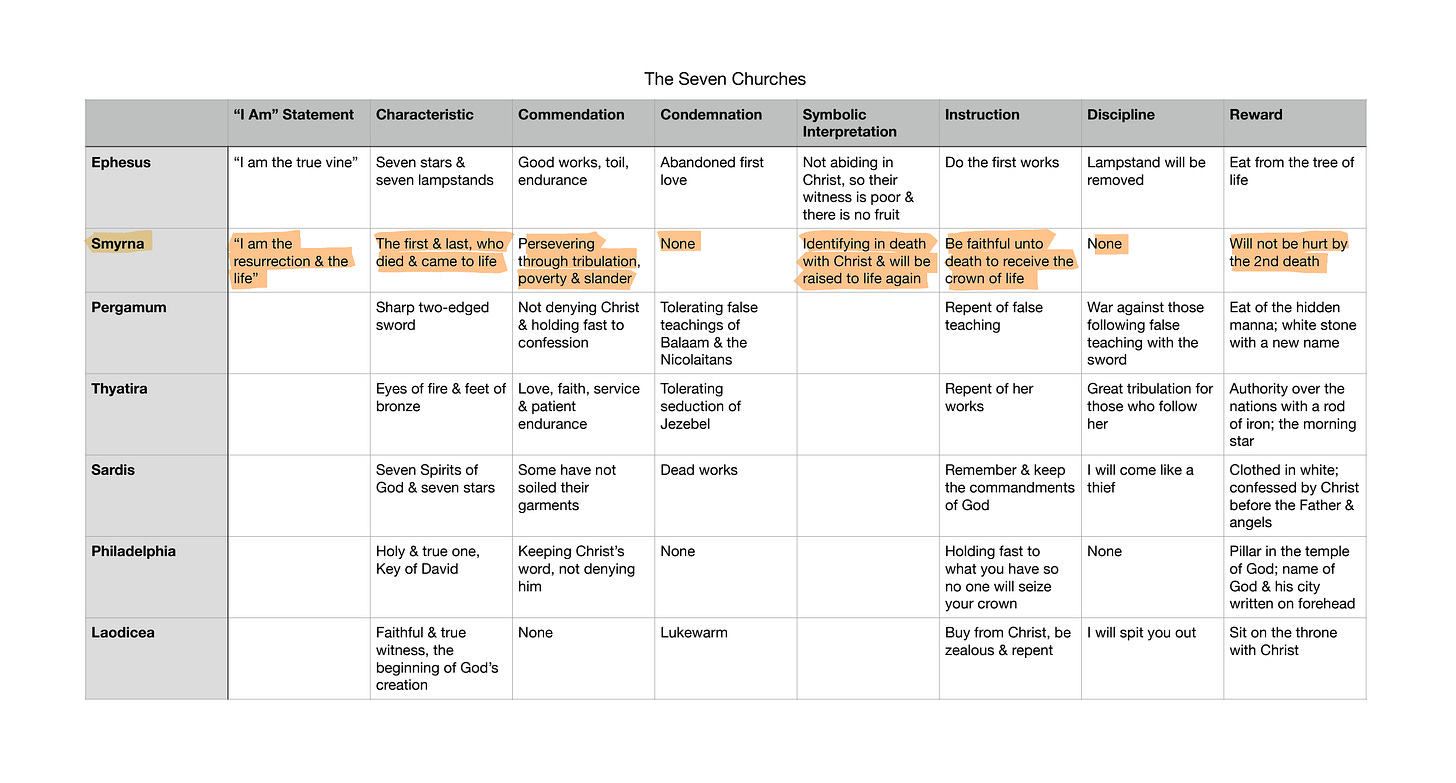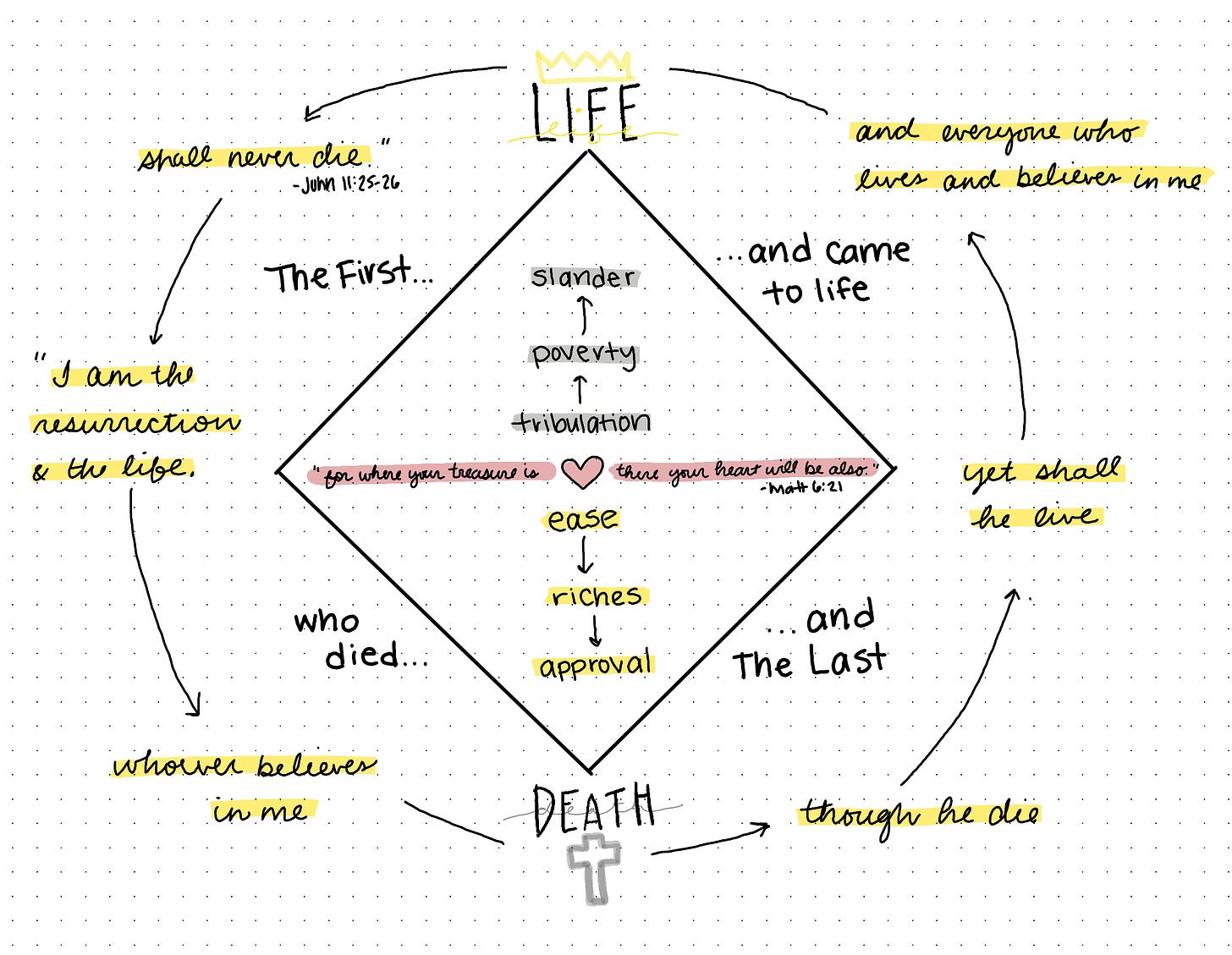“Man, who is born of woman,
is short of days and full of trouble.
Like a flower, he comes forth, then withers away;
like a fleeting shadow, he does not endure.
Do You open Your eyes to one like this?
Will You bring him into judgment before You?
Who can bring out clean from unclean?
No one!
Since his days are determined
and the number of his months is with You,
and since You have set limits
that he cannot exceed,
look away from him and let him rest,
so he can enjoy his day as a hired hand.
For there is hope for a tree:
If it is cut down, it will sprout again,
and its tender shoots will not fail.
If its roots grow old in the ground
and its stump dies in the soil,
at the scent of water it will bud
and put forth twigs like a sapling.
But a man dies and is laid low;
he breathes his last, and where is he?
As water disappears from the sea
and a river becomes parched and dry,
so a man lies down
and does not rise.
Until the heavens are no more,
he will not be awakened or roused from sleep.
If only You would hide me in Sheol
and conceal me until Your anger has passed!
If only You would appoint a time for me
and then remember me!
When a man dies, will he live again?”- Job 14:1-14a
Death. We are all touched without exception. There is, of course, literal death where the body expires and decays. But, in scripture, “death” isn’t always death. We’ve rubbed elbows with this idea—we often talk about “dying to self” as Christians, or “putting to death” the deeds of the flesh.
The Paradigm of Life & Death
There is a fine line of misunderstanding in Christendom today between the prosperity gospel and the biblical gospel. The prosperity gospel says that a Christian should be wealthy, should have good health, and should have a good name in the world. Many of us would look at this and immediately condemn it as a false gospel. However, this is not a foreign idea in the Old Testament. In fact, as much as I hate the prosperity gospel, I can see how this mistake keeps happening among biblically illiterate people.
Blessings & Curses
In Job’s day, and all the way up until Pentecost, to be wealthy was to have the favor of God—at least if you were an Israelite. This is outlined in the blessings and curses of Deuteronomy 28. In verse 1 we read:
“And if you faithfully obey the voice of the LORD your God, being careful to do all his commandments that I command you today, the LORD your God will set you high above all the nations of the earth.” - Deut. 28:1
These blessings included: prosperity in the city and fields, many children, abundant harvest and cattle, plenty of bread, defeated enemies, established holiness and separation unto God, respect and fear of the nations, rain in season, and lending to nations without having to borrow.
Conversely, in verse 15, God warns:
“But if you will not obey the voice of the LORD your God or be careful to do all his commandments and his statutes that I command you today, then all these curses shall come upon you and overtake you.” - Deut. 28:15
The curses were just the opposite: weak cities and fields, barrenness of the womb, famine, dwindling herds, confusion, frustration, destruction from within, disease, pestilence, drought, defeat at the hands of enemies, the contempt of kingdoms. The list of curses continues three times as long as the list of blessings! All of these things could and did lead to the death of many Israelites, but it they didn’t have to. These curses sent by God were considered death in and of themselves and they resulted in Israel’s disintegration as a nation.
Abundance & Poverty
This was life to Israel: to have an abundance of children, wealth, influence, harvest, cattle, and so on. It was life to Job. He had all of these things. That’s why when he lost everything, his friends condemned him and urged his repentance (Job 2-32). In their minds, Job had done something wrong to deserve the loss of all things. And if he hadn’t done something wrong, it was even worse that God would treat him this way! To lose his children, his wealth, his health, his fields and his cattle was to lose his good name and the favor of God. This was death.
To have tribulation, to have poverty, to be slandered by your peers as an evildoer—this was death to an Israelite. All that remained was to literally die as you were so close to being nothing that you might as well be wiped from the face of the earth altogether.
Job’s wife told him as much:
“Then his wife said to him, ‘Do you still hold fast your integrity? Curse God and die.’” - Job 2:9
The story of Job completely turns the Old Testament paradigm on its head. But what does this subversion of expectations have to do with Revelation?
I can’t overstate how this is almost exclusively the point of the entire book. But, unfortunately, I can’t jump ahead to the rest of the book to make that point just yet. (Breaking the fourth wall for a moment: I had to stop to take my glasses off and wipe my face cause I started crying just writing this paragraph.)
The Paradigm Shift
During the time of the apostles, the church was undergoing a transition from what the nation of Israel had always known to a new and better reality. The Jews at that time had been sitting under the errant teaching of the Pharisees for so long, they had lost the kingdom plot. Just like with the prosperity gospel, it would have been easy to miss if you weren’t searching the scriptures for yourself.
(Related: Modern Pharisees.)
Imagine their world. The scriptures were not in the hands of every Jew, and scholars tend to agree that only about 10% of the population was even literate in the first century. Average people depended on hearing the scriptures read by religious leaders weekly at the synagogue.
Reading the New Testament epistles, it’s clear to see there was confusion about what this new paradigm was supposed to look like. Neither Jews nor Gentiles were used to such things as tribulation, poverty and slander being a sign of favor in their culture.
Or was it favor? After hearing their whole lives of Abraham’s renowned wealth, Israel’s rise from slavery into a kingdom with leaders such as the conquering David and the wealthy Solomon, to hear of God restoring his people to abundance, victory, and life after Babylonian captivity… To them, this treatment—this was death. Many times even literally as they were marched to the arenas, the guillotines, or into the fire. And how could people who had strived against such a death their whole lives succumb to it now with any sense of security that they had the favor of God?
The Church in Smyrna
So we open to the letter to Smyrna:
“And to the angel of the church in Smyrna write: ‘The words of the first and the last, who died and came to life.” - Revelation 2:8
Christ says he is “the first and the last.”
What meaning do we typically attribute to this description? —Christ’s eternality. We relate this to similar phrases such as his use of “I am the Alpha and the Omega” in Revelation 1. We say that it means he always was and always will be. By no means is this a wrong interpretation, but I want to propose another consideration relating to our idea about what life and death meant to Old Testament Israel.
The First or the Last
In the parable of the laborers in the vineyard, Jesus used this phrase, “So the last will be first, and the first last” (Matt. 20:16). After speaking to the rich young ruler, Jesus explained to his disciples, “But many who are first will be last, and the last first” (Matt. 19:30). In Luke, Jesus described salvation as a narrow door and ended with: “And behold, some are last who will be first, and some are first who will be last” (Luke 13:30).
There are a few layers of meaning in this phrase, but, for our purposes, it reflects the aforementioned paradigm shift. In context, the passages above center around wealth and influence: the first workers are given the same as the latecomers who haven’t “earned” their right to the same wages; the rich young ruler goes away sad because he is told to give up everything he has—no doubt a move culturally equivalent to giving up God’s favor; and the people in Luke 13 who are turned away by the master of the house have falsely assumed because they have eaten at the king’s table that their association with riches has merited his favor.
See, to be “the first” is to have everything this life has to offer—all the blessings God promised. Sadly, every time Israel seemed to finally lay hold of the promises, they forgot God. They became proud, boastful, and assumed they were walking in obedience just because of what they had and because of their associations.
To be the last is the opposite. After becoming proud and disobedient, Israel incurred the promised curses—that dreaded social death, forfeiting her prosperity and influence among the nations.
Israel would oscillate between being the first and the last for centuries. Between living… and dying.
This is what it means to be first or last. The first have. The last have not. Even if we don’t think of it in terms of living and dying, it’s still the way our culture operates today.
But here’s the horrifying reality: in the eyes of God, we are all last. We’re all dead. That’s because our state before God actually has nothing to do with our adherence to the law or the abundance we experience in this life as a result. So when Christ came preaching that the last will be first and the first last, it’s not surprising that it was offensive to a people who prided themselves on being the chosen ones to whom the oracles of God had been given.
The Tribulation, Poverty & Slander of the Last
So what are the implications of this for the church in Smyrna? The letter continues:
‘I know your tribulation and your poverty (but you are rich) and the slander of those who say that they are Jews and are not, but are a synagogue of Satan. Do not fear what you are about to suffer. Behold, the devil is about to throw some of you into prison, that you may be tested, and for ten days you will have tribulation. Be faithful unto death, and I will give you the crown of life.”
- Revelation 2:9-10
Remember our cadence at the beginning of Revelation? 1, 2, 3. It has continued to show up as we read and it sticks out here. I know your tribulation AND your poverty AND the slander. The church in Smyrna is suffering three particular things. Three things that, in their culture, mean death. Mean God has cursed you. Mean you are the last.
But Jesus reveals that it’s these three things that mark them for life—if only they will endure them to the end. And it’s important to note that there is no condemnation mentioned against this church, which means that they are bearing a good witness and keeping the testimony and commands of Christ. So, in truth, it is not the endurance of these three types of suffering that in and of themselves guarantee their life, but it’s these three things that give evidence of an obedient heart.
And there is a succession to these kinds of suffering. A person who has been saved by God will make a slow walk down to death. First, losing his ease of life. He can no longer fit in with the culture, he can no longer compromise his morals to gain power, influence, health, or wealth. Tribulation becomes his normality. This is followed by poverty. In the event of his upright heart restricting his behavior, he will inevitably lose whatever gains he may have had in this life. Finally, under duress and suffering want—and this is a very important distinction—people who think that they offer service to God will begin to slander him. Accusing him of some sort of wrongdoing that has brought him to this state—just like Job’s peers. Just like prosperity preachers who pin a person’s troubles, poverty, or sickness on a lack of faith.
The Precarious State of “The First”
But, you say, there are many Christians who have plenty, who aren’t suffering tribulation, the loss of their influence or wealth, and are spoken well of by other Christians. And what did Jesus say regarding this instance?
“‘How difficult it will be for those who have wealth to enter the kingdom of God!’ And the disciples were amazed at his words. But Jesus said to them again, ‘Children, how difficult it is to enter the kingdom of God! It is easier for a camel to go through the eye of a needle than for a rich person to enter the kingdom of God.’” - Mark 10:23-25
It was right after the departure of the rich young ruler that he said this. And he followed up by saying “With man it is impossible, but not with God” (Mark 10:27).
So, the rich can be saved. The poor can be saved. Because again, it has nothing to do with social status, but the heart. However, if, as Christians, we suffer none of the three things listed in the letter to Smyrna, we should take great care in examining ourselves to see whether we are compromising with the world to avoid our due persecution.
The First and the Last
This is what it meant to be “the first” or to be “the last.” If any man deserved to be called “the first” it was Christ. “I am the First!” he could have said to us and to the church in Smyrna, and who could protest? But that’s not what he said.
“I am the first and the last, the one who died and came to life.”
Christ suffered these three things: tribulation, poverty, and slander. He died when he should have received the blessings that Israel was promised for obedience. And when he was done dying on earth, he actually died. And this touches briefly on what the end of this letter means:
“The one who conquers will not be hurt by the second death.’” - Revelation 2:11b
Inverting all norms, the one man who should have receive all the promised blessings walked the earth receiving all its curses.
Likewise, Smyrna, even with nothing to condemn, still suffered. Because she was like her Christ. The plight of this church was the same as that of her Savior: she was obedient, she was a good witness, and yet she was dying. Where was her hope?
I Am the Resurrection & the Life
Just as he did to the church in Ephesus, Christ answers this church with who he is.
Remember the conversation Jesus had with Martha outside the tomb of Lazarus? Do you think Jesus could have had the same conversation with the church in Smyrna?
“[The church] said to Jesus, ‘Lord, if you had been here, [we] would not have died. But even now [we] know that whatever you ask from God, God will give you.’ … Jesus said to [the church], ‘I am the resurrection and the life. Whoever believes in me shall never die.” - John 11:21-22, 25-26 (brackets mine)1
Christ was the first but treated as the last. For any other man, that would have been the end. You were treated as last, you are the last. And even if you thought you were the first and were treated as the first, you are the last, too.
Yet in Christ, all men live. Because he endured being the last and was the first to become the first. He suffered the first and the second death. But he also was the first and only man to obtain the second life. So that anyone who believes it will not be hurt by the second death.
Christ came reminding his church that her death would not be the end. In fact, it was the very gateway to life. Job believed it as he sat in the ashes. He told us as much:
“For I know that my Redeemer lives,
and at the last he will stand upon the earth.
And after my skin has been thus destroyed,
yet in my flesh I shall see God.” - Job 19:25-26
(As a wife and a homeschooling mother of three small boys, I work late into the nights to connect scripture in deeper ways for my readers. All of my theological work is free, but if you would like to support me with a one-time donation, you can click the link below!)
This conversation happens between Jesus and Martha about her brother Lazarus, but the same principle applies to the church.
















